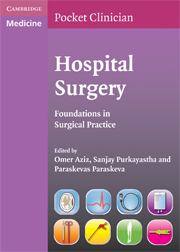Book contents
- Frontmatter
- Contents
- List of contributors
- Foreword by Professor Lord Ara Darzi KBE
- Preface
- Section 1 Perioperative care
- Consent and medico-legal considerations
- Elective surgery
- Special situations in surgery: the diabetic patient
- Special situations in surgery: the jaundiced patient
- Special situations in surgery: patients with thyroid disease
- Special situations in surgery: steroids and surgery
- Special situations in surgery: surgical considerations in the pregnant woman
- Haematological considerations: thrombosis in surgery
- Haematological considerations: bleeding
- Haematological considerations: haemorrhage (massive-bleeding protocol)
- Haematological considerations: blood products and transfusion
- Shock
- Fluid management
- Electrolyte management
- Pain control
- Nutrition
- Antibiotic prescribing in surgery
- Critical care: the critically-ill patient, decision making and judgement
- Critical care: cardiovascular physiology and support
- Critical care: respiratory pathophysiology and support
- Critical care: renal support
- Critical care: other considerations
- Postoperative complications
- Surgical drains
- Abdominal stoma care
- Section 2 Surgical emergencies
- Section 3 Surgical disease
- Section 4 Surgical oncology
- Section 5 Practical procedures, investigations and operations
- Section 6 Radiology
- Section 7 Clinical examination
- Appendices
- Index
Postoperative complications
Published online by Cambridge University Press: 06 July 2010
- Frontmatter
- Contents
- List of contributors
- Foreword by Professor Lord Ara Darzi KBE
- Preface
- Section 1 Perioperative care
- Consent and medico-legal considerations
- Elective surgery
- Special situations in surgery: the diabetic patient
- Special situations in surgery: the jaundiced patient
- Special situations in surgery: patients with thyroid disease
- Special situations in surgery: steroids and surgery
- Special situations in surgery: surgical considerations in the pregnant woman
- Haematological considerations: thrombosis in surgery
- Haematological considerations: bleeding
- Haematological considerations: haemorrhage (massive-bleeding protocol)
- Haematological considerations: blood products and transfusion
- Shock
- Fluid management
- Electrolyte management
- Pain control
- Nutrition
- Antibiotic prescribing in surgery
- Critical care: the critically-ill patient, decision making and judgement
- Critical care: cardiovascular physiology and support
- Critical care: respiratory pathophysiology and support
- Critical care: renal support
- Critical care: other considerations
- Postoperative complications
- Surgical drains
- Abdominal stoma care
- Section 2 Surgical emergencies
- Section 3 Surgical disease
- Section 4 Surgical oncology
- Section 5 Practical procedures, investigations and operations
- Section 6 Radiology
- Section 7 Clinical examination
- Appendices
- Index
Summary
A careful appreciation and understanding of postoperative complications that a patient may face during their recovery period is required by clinical staff in order to respond early and reduce associated morbidity.
Classification
This can be done:
Temporally:immediate (<24 hours); early (<30 days); late (>30 days).
By type of complication: complications of anaesthesia; general complications of surgery; complications specific to type of surgery.
Common presentations
Postoperative pyrexia:Day 0–2: atelectasis, response to trauma (beware of aspiration pneumonia). Day 3–5: UTI, wound infection, cannula site infection, catheter-related sepsis. Day 5–10: wound infection, anastomotic leak, intra-abdominal abscess, DVT/PE (beware of acute acalculous cholecystitis in ICU/HDU (high dependency unit) patients). Weeks/months: prosthesis/implant-related infections.
Postoperative pain: best to avoid this with adequate planning of a patient's analgesic requirement. Pain can significantly affect recovery by: impaired respiratory function (reduced breathing, coughing and secretion clearance), reduced mobility (increases DVT/pressure sore risk), increased cardiac output (myocardial oxygen demand), impaired bowel function, urinary retention and anxiety. For analgesic recommendations see the Pain Control Chapter. Calf pain – beware of DVT (see Haematological Considerations Chapters).
Poor urine output:oliguria is defined as a urine output of ≤30 ml/hr. Anuria means no urine production at all. Most common causes include a blocked urinary catheter, poor fluid replacement (dehydration), or acute renal failure following direct renal injury due to drugs, prolonged hypoperfusion during surgery, transfusion or trauma. Each of these should be ruled out with bladder washout, fluid challenge, and serumurea, creatinine and electrolyte measurement, respectively.
Shortness of breath: important causes include fluid overload (and LVF), pneumonia, PE, unrecognized COPD, pneumothorax (particularly following CVP line, thoracic surgery and thoracic drain insertion).
- Type
- Chapter
- Information
- Hospital SurgeryFoundations in Surgical Practice, pp. 130 - 133Publisher: Cambridge University PressPrint publication year: 2009



